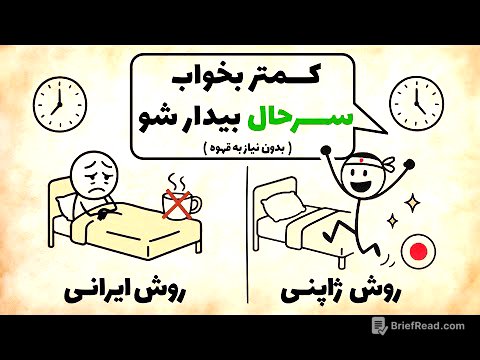TLDR;
This video discusses the issue of customary land in Sarawak, Malaysia, and criticizes the ruling GPS (Gabungan Parti Sarawak) government's handling of it. It highlights the need for a stronger opposition to address the problems faced by the Dayak and other indigenous communities regarding their land rights. The speaker also touches on the influence of the central government and the importance of local leadership in resolving these issues.
- The speaker criticizes GPS for allegedly deceiving the people of Sarawak and prioritizing personal enrichment over the welfare of the community.
- The video emphasizes the importance of MA63 (Malaysia Agreement of 1963) in protecting Sarawak's rights and powers.
- The speaker calls for a change in mindset among Sarawakians, urging them to consider giving the opposition a chance to address the long-standing issues in the state.
Introduction: Nurul Izah's Statement and Sarawak's Customary Land Issue [0:06]
The speaker begins by referencing a statement made by Nurul Izah regarding the struggles of the late Denis, a fighter for the Dayak people's customary land rights in Sarawak. The speaker expresses disappointment that leaders from the ruling GPS party in Sarawak are attacking Nurul Izah instead of addressing the core issue of customary land, also known as NCR (Native Customary Rights) land, which affects various communities in Sarawak, including the Dayaks and Malays. The speaker emphasizes that this issue has persisted since GPS came into power and accuses GPS leaders of deceiving the people of Sarawak.
GPS's History and Deception Tactics [3:24]
The speaker discusses the history of GPS, noting that it was previously part of the Barisan Nasional coalition that ruled Sarawak for a long time. After losing the 14th General Election, they formed their own coalition but consist of the same people. The speaker accuses GPS leaders of deceiving villagers and misusing funds, such as requesting money from the central government to survey Sarawak land, which the speaker argues should be the state government's responsibility. The speaker also mentions the high salaries and allocations for assembly members in Sarawak, questioning why they need to seek funds from the central government for land surveys.
Sarawak's Power and the Importance of MA63 [6:28]
The speaker emphasizes that Sarawak land is the land of the people of Sarawak, involving all races, and highlights the importance of the Malaysia Agreement of 1963 (MA63) in protecting Sarawak's rights and powers. The speaker criticizes the Sarawak government for seeking funds from the central government to measure customary land, arguing that the state government has the power and resources to do so themselves. They point out that the state government can measure land for FELDA (Federal Land Development Authority) and Tabung Haji, questioning why they can't do the same for customary land.
Examples of GPS's Actions and the Need for Change [8:15]
The speaker provides examples of GPS's actions, such as collecting people's house grants and making them collect them from far away places to collect house tax. The speaker contrasts this with the actions of Shafie Apdal, the former Chief Minister of Sabah, who issued grants when Warisan was in power. The speaker expresses opposition to GPS, citing their selfishness and arrogance, and criticizes their response to Nurul Izah's statement. The speaker also claims that GPS has no money and relies on the people's money, including funds from the central government and GLCs (Government-Linked Companies).
Criticism of GPS Leaders and Their Self-Enrichment [11:17]
The speaker continues to criticize GPS leaders, accusing them of enriching themselves and their cronies at the expense of the Dayak community. The speaker challenges any GPS assembly leader to a debate and accuses them of lying to the villagers. They provide an example of land issues in Kampung Selampit, where people face difficulties building houses due to FELDA land claims. The speaker also notes that FELDA officials are mostly from Peninsular Malaysia, while Sarawakians are relegated to cutting down oil palm trees.
The Need for a Strong Opposition and Change in Mindset [13:40]
The speaker expresses disappointment that many Iban people continue to support GPS despite the ongoing issues with NCR land. The speaker urges Sarawakians to change their mindset and give the opposition a chance to win seats in the state election. They argue that a strong opposition is needed to ensure that the people's voices are heard in the Sarawak State Legislative Assembly. The speaker also criticizes the appointment of counselors in villages, who are paid salaries and act like special officers, undermining the village head.
Sarawak's Unique Political Landscape and the Role of MA63 [26:08]
The speaker explains that Sarawak's political landscape is unique compared to the states in Peninsular Malaysia, as it is like a region controlled and conquered by whoever becomes the government. The speaker notes that while Sabah's MA63 is slightly different, Sarawak's MA63 is being used by the ruling party to maintain their power. Despite criticizing GPS, the speaker acknowledges that not all GPS politicians are flawed.
GPS's Inaction and the Need for Accountability [27:04]
The speaker criticizes GPS for only becoming active in constituencies when elections are near and questions why they are jumping on the issue of customary land only after Nurul Izah's statement. The speaker challenges the Sarawak government to prioritize giving customary land to the various communities in Sarawak. They also highlight the issue of logging companies oppressing people close to Ulu and accuse them of being cronies of the government.
The Speaker's Vision for Sarawak and the Call to Reject GPS [30:12]
The speaker states that there is no central authority when it comes to customary land and criticizes GPS leaders who claim they need money from the center to survey the people's land. The speaker expresses a desire to become the premier of Sarawak and address the land issues by signing grants and giving land to the people. The speaker urges Sarawakians to reject GPS in the upcoming PRN and give a change to the poor people in the interior.
Addressing the Mentality of Sarawakians and Concluding Remarks [33:37]
The speaker addresses the mentality of some Sarawakians who believe that at least under GPS, there is visible development, albeit slow. The speaker argues that this mentality is flawed and that Sarawakians should not settle for slow progress. The speaker concludes by stating that they are speaking as a native of Sarawak, advocating for the rights of the people and expressing anger towards the GPS leaders in their area. The speaker emphasizes that the underground doesn't know why he doesn't have a people's soul and entered politics just to fill his own pockets.









